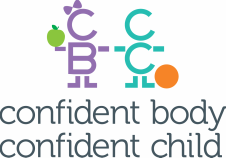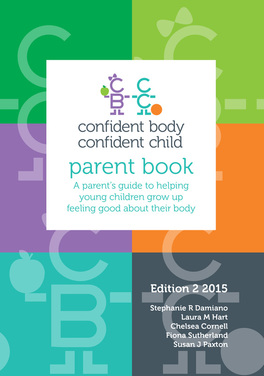about confident body confident child
_ _ _ _ _ _ _ _ _ _ _ _ _ _ _ _ _ _ _ _ _ _ _ _ _ _ _ _ _ _ _ _ _ _ _ _ _ _ _ _ _ _ _ _ _ _ _ _ _
|
Confident Body, Confident Child is an evidence-based resource providing parenting strategies to promote positive body image, healthy eating and physical activity in children aged 2 to 6 years. The resource aims to support and guide parents or guardians, to create an environment in which their children can develop body satisfaction and healthy eating patterns. Although developed for use in early childhood, the ideas in the resource will also be valuable for older children.
Confident Body, Confident Child was developed by a team of researchers from the School of Psychology and Public Health at La Trobe University, Australia. The health promotion charity Body Confident Collective now house Confident Body, Confident Child and are disseminating the program to the public. Confident Body, Confident Child was developed from the best available research evidence arising from an extensive review of published research studies, public websites, and existing parent resources. A Delphi consensus study was also conducted with a group of experts to find the safest and most reliable strategies parents can use with their young children, to help prevent body dissatisfaction, eating disorders, and obesity. Finally, interviews and focus groups were held with parents of 2- to 6-year-olds, Maternal and Child Health Nurses, and Directors of Child Care Centres to understand what parents would like to learn about child body image and healthy eating patterns, and how a resource can meet their needs. The Confident Body, Confident Child resource therefore contains the best available evidence for parents and is specifically designed to meet their needs. The Confident Body, Confident Child resource and parent workshop has been evaluated in two randomised controlled trials. The results showed that parents who received the Confident Body, Confident Child resource and attended a parent workshop reported significantly more positive parenting strategies, greater knowledge of child body image, significantly less negative parenting strategies, and fewer negative parental feeding practices, than the parents receiving a nutrition-only resource or in the wait-list control group. Importantly, these changes were maintained at 6-months and results are just as effective when the program is presented to parents via face-to-face workshops, or virtually over zoom! Evaluations show that Confident Body, Confident Child effectively improves parenting practices associated with childhood body dissatisfaction and unhealthy eating patterns. The Parent Book and website are divided into a number of sections designed to answer common questions parents have. Within these sections you will be provided with information about what influences the development of a child’s body image and healthy eating patterns, and practical tips you can use to help your child group up feeling confident in the body they have. Throughout the website you will also be directed to activities, videos, and fact sheets. |
why should i use confident body confident child?
_ _ _ _ _ _ _ _ _ _ _ _ _ _ _ _ _ _ _ _ _ _ _ _ _ _ _ _ _ _ _ _ _ _ _ _ _ _ _ _ _ _ _ _ _ _ _ _ _
Research has found that the way a child feels about their body starts to develop as early as three years, even though the benefits of positive feelings about their body, and problems associated with negative feelings, may not be seen until years later. The earlier steps are taken to build positive body image in children, the better.
A child’s body image may be influenced by a number of personal factors (e.g., biology, temperament) and environmental factors that may be outside the family (e.g., exposure to certain media). Family influences also play an important role in the development of body image and eating patterns in children. Parents are of course highly motivated to provide the most positive environment they can for their growing child, but many want to know more about how to discuss healthy eating, without encouraging their child to think negatively about their body.
Part of promoting the development of positive body image in your child involves promoting healthy eating patterns and attitudes towards food. There are both physical and emotional benefits to establishing healthy eating patterns and attitudes early in life. For example, healthy eating patterns and attitudes can help to protect a child from developing later problems with food, eating, their body, and self-esteem.
This website will focus on the important role YOU can play in promoting positive body image and healthy eating patterns in your child. This will include how to build resilience in your child against social influences, such as extended family, peers, and media.
A child’s body image may be influenced by a number of personal factors (e.g., biology, temperament) and environmental factors that may be outside the family (e.g., exposure to certain media). Family influences also play an important role in the development of body image and eating patterns in children. Parents are of course highly motivated to provide the most positive environment they can for their growing child, but many want to know more about how to discuss healthy eating, without encouraging their child to think negatively about their body.
Part of promoting the development of positive body image in your child involves promoting healthy eating patterns and attitudes towards food. There are both physical and emotional benefits to establishing healthy eating patterns and attitudes early in life. For example, healthy eating patterns and attitudes can help to protect a child from developing later problems with food, eating, their body, and self-esteem.
This website will focus on the important role YOU can play in promoting positive body image and healthy eating patterns in your child. This will include how to build resilience in your child against social influences, such as extended family, peers, and media.


